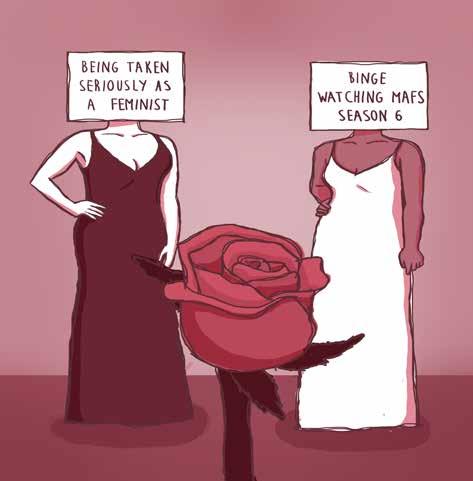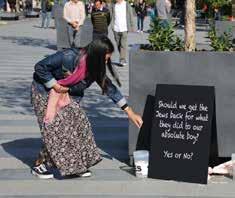ANALYSIS
What I learned from my OLE exchange experience Lei Yao and Zhiquan Gan explore the country exchange experience course together. I still remember the awkward moment when my German friend sent me “Frohes chinesisches neues Jahr (Happy Chinese New Year)” on Facebook a month ago. At that time, I didn’t even remember what the sentence actually meant. He was one of the few local students I met at Humboldt University of Berlin. When I replied, with my poor German knowledge the only word that appeared in my mind is “danke”, which means “thank you” in English. Shaking my head helplessly, I grinned bitterly and ended this brief greeting with “danke”. It was only then that I finally realised I could barely remember anything that I learned during the half month exchange in Germany. I do wonder about the value of the Open Learning Environment (OLE) incountry experience, aside from the freshness of visiting a totally strange country, the indulgence of exchange life and the considerable achievements on my transcript. The OLE in-country experience program is a brand new study unit put forward by the university in 2018 after teaching reform. The program usually consists of two parts, learning a new second language in foreign countries and participating in several cultural courses offered by the partner universities. It aims to provide students with interdisciplinary learning experiences and enriches their language learning background when they complete their degrees. Today, the development of
OLE in-country experience units seems to deviate from the original goals set by the university. The first and most prominent problem is that it is difficult to achieve the expected language learning target during the two or three weeks study time. Initially, when the School of Languages and Cultures established the unit curriculum, the target groups for OLE in-country experience units were students with little or no knowledge of a second language. Referring to the European Common Language Reference (CEFR), the language learning outcome planned by the OLE unit of study outline only reaches A1 level, breakthrough or beginner, which is the same as the other language units provided by the university. Apart from that, the learning results of OLE experience country programs are more limited than other language units. I have taken two language units in the university, FRNC 1601 French Introduction 1 and OLES 2153 Experience Germany. Compared with German, I have a more solid French background after finishing these two units. Learning and memory established through repetition and practice throughout a whole semester are far more effective than a half month of intensive learning. Next, the unit of study outlines provided by the partner universities are nearly out of supervision. Thus, it leads to another serious consequence – learning experience and outcomes
between different courses may vary from unit to unit. Isabella Cui, a Medical School student, told me in the interview that, “I strongly recommend everyone to take OLES 2147 Experience Italy. We don’t have any quizzes or exams during the exchange time. Only need to shoot a short Vlog. And everyone gets a satisfactory score”. However, not every student is as lucky as Isabella. Fengwei Yu, a Sydney Law School student, holds a different view towards the OLE unit. “We are the first exchange students to attend The Jean Moulin University Lyon 3. During the three weeks study time, we have to suffer endless French grammar quizzes and tests. Most importantly, the majority of students get very low marks. Initially, I wished to improve my WAM through this unit”. Indeed, many students are forced to undertake unnecessary risks of “selecting the wrong course” in the lack of uniform assessment standards. Therefore, for most students, there are two reasons to choose OLE exchange units - being able to achieve a relatively high score with minimal effort and travelling to a new country to have fun in the name of study. Students’ purposes in picking study units may no longer be to choose the language of their interest but, rather to select “highscore” courses and travel destinations. Another problem that needs to be considered are the costs involved for what is a less effective learning program. Since most partner exchange destinations are in the northern
hemisphere, the round flight ticket is about $2000, taking the cheapest economy class ticket as an example. Taking into account accomodation, food and travel, the costs are exorbitant for both domestic and international students. Although the university provides $1000 exchange scholarships for students who achieve over 70 WAM, it’s still hard to cover the full cost of the exchange. Lastly, as exchange students, we rarely have opportunities to communicate with local students. During my exchange in Germany, Humboldt University of Berlin did not provide us with the opportunity to connect socially with local students. The only non-language course - an introduction to the German political system - was also studied with my classmates from the University of Sydney. It seems like we are observing others across the glass, but still cannot truly get involved. The only thing that the exchange confirmed is that I still use English when communicating with other nonnative English speakers. We always talk in English unconsciously after a brief greeting in the other’s mother tongue. I know it’s an unrealistic thing to master a completely foreign language in such a short time. But I do hope that OLE exchange units can provide students with better and more authentic language learning experiences rather than becoming a choice to escape from the pressure of other units.
三个星期: 我们开启的是学习还是一场逃离 Lei Yao and Zhiquan Gan 共同评估 OLE 交换项目 我仍然记得一个月前,我的德国朋友在 脸书上发给我 “Frohes chinesisches neues Jahr (新年快乐)” 时,我一脸茫然的窘 境。他是我在柏林洪堡大学认识的为数不 多的当地学生。 当我尝试着用我为数不多的德语知识去 回复时,脑海中仅剩唯有“Danke (谢谢)” 。 我摇摇头,苦笑一声,只得用 “Danke” 结束了这次短暂的寒暄。直到此时,我才 发现,在德国半个月所学的知识几乎被我 遗忘殆尽。我不禁开始思考,除了造访陌 生国度的新鲜感,半个月疯玩带来的放纵 感以及成绩单上较为可观的成绩外,这门 OLES 2153 Experience Germany 究竟还给 我留下了什么。 OLE In-country Experience Program 是 悉尼大学于2018年教学改革后推出的全新 的模块。项目通常由两部分组成,去外国 学习一种全新的第二语言以及参与学习对 应学校提供的文化课程。其初衷是帮助学 生在完成既定学位的同时,提供给学生交 叉学科的学习体验和丰富语言类的知识结 构。而如今,OLE的发展似乎背离了学校 最初设定的目标。 首先最突出的问题是,为期半个月的学 习很难达到预期的语言学习效果。School of Languages and Cultures 在课程设置之 初,OLE In-country Experience Program 的受众群体就是那些对第二语言完全没有 了解或者几乎没有了解的学生。课程学 习大纲所规划的学习目标,如果参考欧
6
洲共同语言参考标准,也不过是 A1 入门 级别而已。以我的亲身经历来说,我在悉 尼大学一共学习过两个语言类模块,分别 是 FRNC 1601 French Introduction 1 以及 OLES 2153 Experience Germany。可以负 责任的说,法语的综合学习体验远远好过
学生所选择的课程目的 可能不再会是单纯的选 择自己感兴趣的语言, 而是更容易拿高分的课 程以及自己感兴趣的旅 游目的地。
德语。学习过第二语言的学生都应该知 道,通过一整个学期反复强调所形成的语 言学习记忆远远比半个月集中学习所带来 的效果要好。 其次,对应的交换学校在 OLE In-country Experience Program 的教学大纲上面 拥有极大的自主性。这就造成了另一个不 能忽视的严重后果,不同课程之间的学 习体验可能千差万别。悉尼大学医学院的 学生 Isabella Cui 在接受这次采访时告诉 我,“我强烈建议选择 OLES 2147 Experience Italy 这门课程。我们没有任何的考 试,期末的最终考核仅仅是拍一段短视频 而已。而且每个人都得到了相对较高的分 数。”然而,不是每一个学生都会像 Isa-
bella Cui 一样幸运。悉尼大学法学院的学 生 Fengwei Yu 对 OLE 课程持有不同的观 点,“我们是第一届去里昂三大的学生。 在为期三周的学习里,我们不得接受频繁 的语法测试。更重要的是,每一个学生的 分数都非常的低。我本来希望能通过这门 课去提高我的均分。” 的确,在缺乏统一 的教学考核标准之下,很多学生被迫承担 了“选错课“的不必要风险。 正因如此,选择 OLE In-country Experience Program 的原因可能会被缩小到如 下两点,以能以相对于悉尼大学其他课程 更少的努力获得一个相对较高的成绩以及 可以假学习之名去旅游。学生所选择的课 程目的可能不再会是单纯的选择自己感兴 趣的语言,而是更容易拿高分的课程以及 自己感兴趣的旅游目的地。 另一个非常现实的问题,高昂的住宿旅 行以及学费和收效甚微的课程学习成果之 间让人产生了巨大的心理落差。 悉尼大 学 OLE的合作院校大多在北半球,以最 便宜的经济舱为例,来回往返的机票大约 是在2000澳元左右。如果算上课程期间的 食宿交通以及旅行费用,无论是对本地学 生还是国际学生来说,都是一笔不可忽视 的巨大开销。尽管悉尼大学为均分在70分 以上的部分学生提供了价值1000澳元的交 换奖学金,这很难涵盖本次交换学习的全 部费用。 除此之外,作为交换生的我们,很少有 机会与对应院校的学生进行交流。在我参
加德国的交换学习期间,柏林洪堡大学没 有给我们提供与当地学生共同学习交流的 机会。唯一的文化类课程,以我参与的德 国政治体系导论而言,也是和悉尼大学的 学生共同学习的。我们如同隔着一面玻璃 近距离的观察别人的生活,却始终无法真 正的融入。 唯一可以确定的是,我仍然习惯用英语 和非英语为母语的朋友用交流,这个事实 并没有因为学习任何第二外语而改变。我 们总是礼貌的在用各自的语言进行短暂的 寒暄之后,迅速投入热烈的英语交流中。 我知道,通过几周的时间去掌握一门完全 陌生的语言是一件不现实的事情。但我还 是希望 OLE In-country Experience Program 能够给所有学生带来更优质的语言 学习体验而不是沦为学生逃避其他课程压 力的无奈之选。
Photo by Zhiquan Gan












